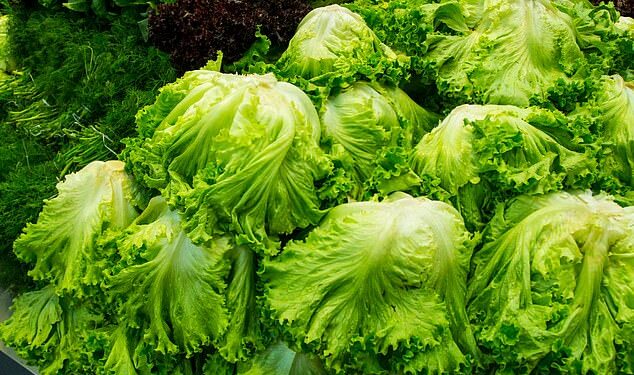Health officials have sounded the alarm over an alarming surge in two potentially deadly bacteria linked to four popular lunch products.
Smoked fish, soft cheeses and beef products were blamed for seven outbreaks of listeria in 2023, the UK Health Security Agency (UKHSA) said.
The nasty bug — which can kill — usually causes a fever, sickness and diarrhoea.
More than 280 people, meanwhile, were struck down by a virulent form of food poisoning that was linked to contaminated lettuce grown in the UK last summer.
An investigation by food safety experts linked the outbreak of Shiga toxin-producing E.coli (STEC) — a rare strain of the diarrhoea-causing bug E.coli — to multiple types of ready meal sandwiches containing the leaves.
In a fresh report analysing UK infectious disease trends, the UKHSA warned that awareness of ‘high-risk products’ for listeria and STEC was now ‘essential’, particularly among vulnerable groups.
‘It is also vital clusters and outbreaks of these pathogens are rapidly detected and investigated so that prompt control measures can be implemented,’ they said.
Dame Jenny Harries, UKHSA chief executive, added: ‘Our scientific capability and the introduction of new interventions are all helping to keep people safe and well, but our report also highlights that we have plenty of work and opportunities ahead.
An investigation by food safety experts linked the 2024 outbreak of Shiga toxin-producing E.coli (STEC) — a rare strain of the diarrhoea-causing bug E.coli — to multiple types of ready meal sandwiches containing lettuce

Symptoms of Shiga toxin-producing E.coli include severe diarrhoea and vomiting, according to the UK Health Security Agency

Smoked fish, soft cheeses and beef products were blamed for seven outbreaks of listeria in 2023, the UK Health Security Agency (UKHSA) said
‘Along with our partners across the healthcare sector, we need to be bolder. Behind this data there are real people, people who are sick or at risk of becoming sick, and in some cases dying.’
The report found a total of 177 cases of listeriosis were reported in England and Wales in 2023 — up 13 per cent on the five year average.
This remained steady in 2024, with 178 cases reported.
But listeriosis is a serious infection usually caused by eating food contaminated with the bacterium listeria monocytogenes, officials warned.
One sixth of all infections in 2023 were associated with pregnancy, of which almost a quarter resulted in stillbirth or miscarriage.
Food contaminated with listeria monocytogenes may not look or smell spoiled but can still cause serious and sometimes life-threatening infections.
For most people, listeria poisoning can be similar to flu and include high temperature, muscle ache or pain, chills and feeling or being sick.

Those who eat food containing listeria develop an infection called listeriosis, which can cause a fever, aches and pains, chills, nausea, sickness and diarrhoea
Usually symptoms recede after a few days.
In rarer cases the infection can be more severe, causing life-threatening complications, such as meningitis.
Officials, however, also raised the alarm over a surge in cases in STEC seen ‘since the Covid pandemic’.
Last year more than 60 sandwiches, wraps and salads sold in 11 major shops in the UK were slapped with ‘do not eat’ alerts over fears they could contain STEC.
The STEC outbreak sickened 288 patients, caused nine cases of haemolytic uremic syndrome (HUS) — a life-threatening condition that can lead to kidney failure — and two deaths, the UKHSA said.
Experts believe lettuce’s texture can make it more prone to the bacteria and fact it’s not cooked, which would usually kill off bugs, increases the risk.
Symptoms of infection vary from stomach cramps and vomiting to bloody diarrhoea, UKHSA says, with around half of people infected experiencing the latter.
However, it is often difficult to spot because the same symptoms can be caused by a variety of bugs, including norovirus.

In December, a 17-year-old girl from Buckinghamshire was left fighting for her life after contracting the deadly E. Coli strain. Antonia Hay is believed to have caught STEC-HUS, caused by E. coli O157, from food at a Christmas market in Great Missenden

Officials have not yet traced the source of the outbreak of Shiga toxin-producing E.coli (STEC), a rare strain of the diarrhoea-causing bug. But they believe it is linked to a ‘nationally distributed food item’ or ‘multiple food items’

It comes just days after manufacturers Greencore Group and Samworth Brothers Manton Wood recalled more than 40 of its own sandwiches, wraps and salads sold across 10 major UK supermarkets
STEC is considered to be extremely infectious, and in up to 15 per cent of cases, the bug can cause HUS.
STEC can also be spread by touching infected animals or their faeces directly, as well as coming into direct contact with infected people’s waste, for example in the case of carers looking after older people.
It can also be spread through contaminated water, either via drinking tainted supplies it or accidently ingesting it while swimming.
According to the annual report, other bacterial infections rose including clostridium perfringens infections — rising to 1,702 cases, up on the 1,659 logged in 2023.
Meanwhile, yersinia increased from 454 to 660 and cyclospora cases almost doubled from 61 in 2023 to 123 in 2024.
Between 2022 and 2024, Campylobacter laboratory reports rose 27 per cent between 2022 and 2024, with 70,300 cases.
Campylobacter is the most common source of food poisoning. It typically causes diarrhoea, nausea and vomiting that gets better naturally within a week.
In severe cases, however, it can be life-threatening for vulnerable groups, including young children, the elderly and immunosuppressed.
Apart from the misery and pain of the illness itself, the Food Standards Agency (FSA) estimates the bacteria costs the economy some £900million a year in terms of NHS treatment and lost days at work.







